How to Use ばかりです (Bakaridesu) in Japanese | Just Happened and Repetition
Share
In Japanese, 「ばかりです」 is used to express that something has just happened or that something is continuously happening in a negative way. It shows either immediacy (something just finished) or a feeling of "only doing" one thing excessively.
How to Use ばかりです
There are two main patterns:
-
Verb (past form) + ばかりです
Example: 食(た)べたばかりです。("I just ate.") -
Verb (て-form) + ばかりいる
Example: 遊(あそ)んでばかりいる。("He is only playing.")
Past form + ばかりです emphasizes that something has just occurred.
て-form + ばかりいる criticizes that someone keeps doing the same thing.
Meaning Details
When talking about something that just happened, it feels neutral or factual.
When talking about continuous repetition, it often carries a negative nuance, like frustration or blame.
Examples
- 会(あ)ったばかりです。("We just met.")
- 彼(かれ)はテレビを見(み)てばかりいる。("He is only watching TV.")
- 文句(もんく)ばかり言(い)っている。("He only complains.")
Quick Tip
Use past + ばかりです for immediate past events.
Use て-form + ばかりいる when criticizing repetitive behavior.










